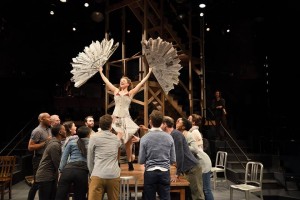
Photo by Mark Turek.
Going to the theater is always a communal experience. Even in a movie theater — who’s never experienced a time when fellow audience members applauded at the end, or cheered for a good line? And how much more communal is the experience when you and the people you’re packed into the seats with are sharing the room with the artists? Trinity Rep’s new production of Ragtime, directed by Curt Columbus, takes full advantage of theater’s communal dimension. From the opening number, where immigrant and labor activist Emma Goldman’s (Janice Duclos) “Let me at those sons of bitches!” was met with a laugh and a cheer from the audience, to a passionate speech late in the play, calling out callous respectability that received as much applause as any musical number, Trinity’s production invites viewers to feel the characters’ struggles as their own, and viewers are responding.
Goldman, like the “sons of bitches” Fred Sullivan’s J.P. Morgan and Brian McEleney’s Henry Ford, is one of the real-life historical characters who act as a chorus to the fictional story of three families: a black couple, Coalhouse Walker Jr. (Wilkie Ferguson III) and Sarah (Mia Ellis), and their son; a white upper-class suburban family, headed by Mother (Rachael Warren, perfectly cast); and two Jewish immigrants, Tateh (Charlie Thurston, in as wonderful and sincere a performance as ever) and his daughter. These stories provide not only the maybe-expected narratives of the oppressions imposed on various groups by the America in which so many dream of playing an equal part, but also, importantly, a model of standing up. Mother, for instance, finds her liberation from the limited role prescribed for (wealthy) women not in shedding her corset – although she does, more on that in a moment – but in protecting Sarah and her infant son when her husband (Mauro Hantman) and social propriety would have it otherwise.
There are zero weak links in the cast (it’s hard to choose who to mention, but Stephen Thorne as Harry Houdini escapes from straitjackets and things on stage and that’s pretty cool), but Ellis’ performance of the tragic “Your Daddy’s Son,” and the hopeful “Wheels of a Dream,” where Ellis’s Sarah and Ferguson’s Coalhouse dream of their son traveling through a free America, combine strong musical performances with a powerful emotional pull to make those numbers highlights of the show.
Columbus and his actors do a lot with a little; in the true Trinity spirit, the set (by Eugene Lee) represents a rehearsal room, and costume designer Kara Harmon puts the cast in street clothes for the first act, then in traditional early 20th century costumes for the second. Warren’s costume change back to street clothes in the second act heralded, for me, less Mother’s personal liberation and more a pointed reminder that the issues the play touches on – the struggles of immigrants, the police murders of unarmed black Americans – are completely contemporary. (Columbus says, “All of the issues in 1905 that E.L. Doctorow is writing about are the issues of today … the Black Lives Matter text of the book, the women’s rights text of the book, and the immigration text of the book are literally everything we are dealing with now … What I hope is that maybe we can make changes as a community so that these issues are not still the burning issues of 50 years from now.”) The use of contemporary dress also allows for another moment of communal understanding toward the very end of the play; I don’t want to spoil it, because it’s incredibly effective not only to see the choice the production made in tying the play’s events to the present day, but to be in a room full of other people who also see and understand that visual, and to wonder how much that mass of people could do with that understanding and community.
Trinity evokes this feeling very intentionally, bringing up the house lights as Coalhouse urges his supporters to tell the story of their fight for justice and “make them hear you.” Nor do they want viewers to let their outrage at injustice or their zeal for change simply drain away after an evening at the theater – during the run of Ragtime, they are registering voters in the lobby. In this way, they’re trying to work toward the aspirational America of the play – maybe not the one it shows as a current reality, but the one its characters dream of.
Ragtime runs through May 27 at Trinity Repertory Company, 201 Washington St, PVD. For tickets and more information, go to trinityrep.com


